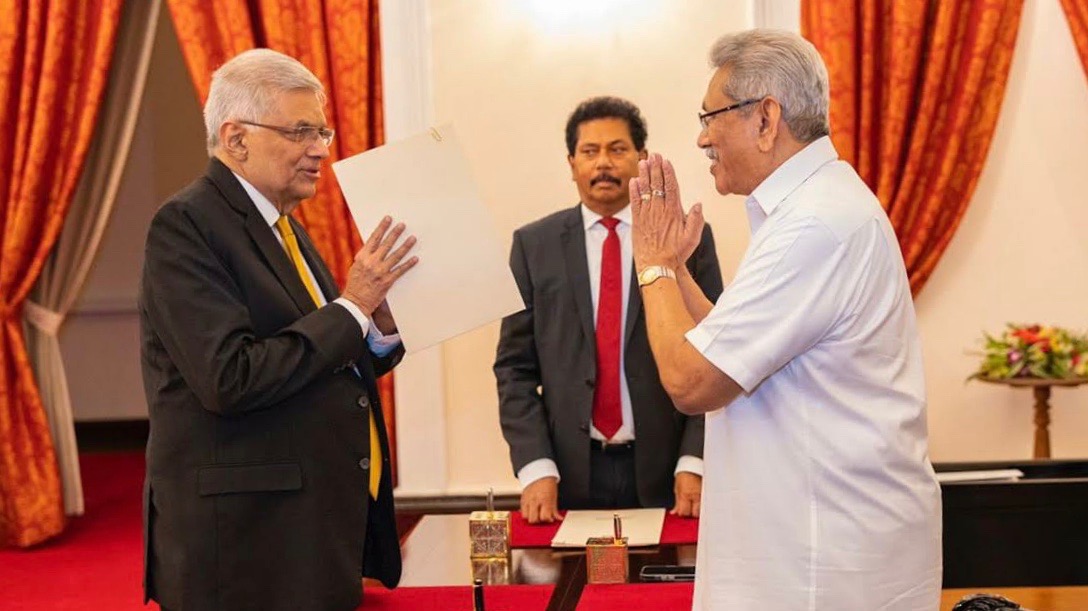After a week of confusion, chaos, and a cabinet-less political limbo, Sri Lanka’s President Gotabaya Rajapaksa finally appointed veteran politician and leader of the United National Party (UNP) Ranil Wickremesinghe as the new Prime Minister.
He was sworn in as the 26th Prime Minister of the country after winning a majority vote in the parliament with 160 out of 225 votes.
Wickremesinghe will be serving his sixth term as Prime Minister. Earlier, he has served premiership from 1993 to 1994, 2001 to 2004, 2015 to 2018, and 2018 to 2019. He is also the sole representative of his party in the parliament.
The decision to appoint Wickremesinghe as the new Prime Minister was concluded at the all-party leaders meeting that took place online on May 11. Following the Prime Minister’s announcement of resignation on Monday, May 9, a gazette notification released by the President’s office confirmed that an interim government would be formed inviting all political parties in the country.
Shortly after coming to power, Wickremesinghe took to Twitter to share his plan of action to pull the country out of its current economic crisis with regard to the food, fuel, forex and medicines shortage.
Wickremesinghe also mentioned his plans to bring a new amendment (21st) to annul amendment 20A and curb the presidential powers provisioned by it.
4/ 21st Amendment: This will be taken up for discussion with the Attorney General's Department tomorrow and then be presented to Cabinet for approval.
— Ranil Wickremesinghe (@RW_UNP) May 15, 2022
In the same context, President Gotabaya Rajapaksa had also made several important announcements regarding the new government that is to commence work under the premiership of Wickremesinghe to prevent the country from falling into a state of “anarchy”.
1/4
Steps will be taken to form a new gov to prevent the country falling into anarchy & to maintain the affairs of the state that have come to a halt.A PM who commands majority in Parliament & is able to secure the confidence of the people will be appointed within this week.
— Gotabaya Rajapaksa (@GotabayaR) May 12, 2022
He declared that the demands for the abolition of the executive presidency will be “considered” and that steps will be taken to “re-enact” the contents of the 19th amendment to the constitution to empower the parliament.
The enactment of the historic 19th amendment in April 2015 was rushed by the then Prime Minister Ranil Wickremesinghe. It had removed the powers of the President to sack the Prime Minister at his discretion.
Confusion and a divided opposition in the run-up to PM appointment
In the latest developments, Samagi Jana Balawegaya or SJB, the main opposition party in the Sri Lankan parliament, said that it has decided to support the new government headed by Prime Minister Ranil Wickremesinghe on “progressive decisions taken to uplift the economy”.
This comes after SJB President and Leader of Opposition Sajith Premadasa rejected the offer of the Prime Minister position under Gotabaya’s presidency. Premadasa was a former aide of Wickremesinghe before he broke away from the party to form SJB.
Other opposition parties like the Sri Lanka Freedom Party (SLFP) and independent parties have also been in a similar to and fro in extending their political support to the Prime Minister.
Sri Lanka’s week of violence
Amid growing protests and anger at the government, Sri Lanka witnessed more than 48 hours of violence beginning on May 9 which saw vehicles and houses belonging to former ministers or MPs of the ruling Sri Lanka Podujana Peramuna (SLPP) party destroyed.
According to the data released by the secretary of the Ministry of Defense, last week’s violence resulted in 9 deaths, including two police officers, and over 220 people injured. Moreover, 41 incidents of setting fire to vehicles and 136 incidents of damage to property were also recorded. Most of the properties damaged since May 9 belonged to former politicians and MPs of the ruling party.
Houses of 38 former politicians and members of parliament were attacked on Monday May 9. Three residences of the Prime Minister, in Colombo, Kurunegala and Hambantota, were also set on fire by the attacking group.
United Nations Human Rights High Commissioner Michelle Bachelet condemned the escalating violence in Sri Lanka amid the severe economic and political crisis and urged the authorities to prevent further unrest.
.@mbachelet urges restraint & pathway to dialogue as violence escalates in #SriLanka.
“I call on the Government to address the broader political & systemic root causes that have long perpetuated discrimination & undermined #HumanRights.”https://t.co/SE4DGGrB6Z pic.twitter.com/MGLF0lWU4k
— UN Human Rights (@UNHumanRights) May 10, 2022
On May 9, pro-SLPP crowds attacked protesters in Colombo near Galle Face Green where peaceful anti-government protests had been taking place for over a month. Mahinda Rajapaksa, Wickremesinghe’s predecessor, has taken to hiding at a naval base out of Colombo.
The Attorney General has advised the IGP to expedite the investigation into the Galle Face attack. Meanwhile, the CID has been instructed to probe the incident#SriLanka #lka #GalleFaceProtest #CrisisLK pic.twitter.com/n3AAaakiou
— DailyMirror (@Dailymirror_SL) May 10, 2022
While chaos and violence gripped the island last week, the economic crisis has continued unabated. International Monetary Fund’s (IMF) mission chief Masahiro Nozaki has said that technical level discussions between its officials and Sri Lankan authorities are taking place from May 9 to May 23.





